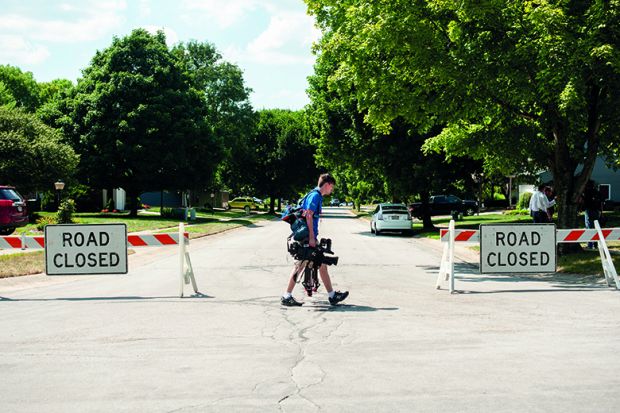Eli Hoff has wanted to be a journalist since he was nine years old. It wouldn’t take him long.
By 15, Mr Hoff was covering professional soccer for a regional spin-off of a national digital media company. This summer, he reported on the US Congress as part of the largest newsroom in the state of Missouri.
Mr Hoff is 21 now and still an undergraduate at the University of Missouri, where journalism students under the supervision of faculty send daily coverage from that busy newsroom to media outlets across the state.
It is one of a fast-growing number of such efforts by US university journalism programmes to fill the void created by the closing and dramatic downsizing of newspapers that once were mainstays of their communities and watchdogs over government and business.
THE Campus views: It’s time for the media to work with universities, not against us
“We see journalism as something we have to fight for,” Mr Hoff said. “And we’re a generation willing to fight for these things.”
The US has lost one-quarter of its newspapers since 2004 from a combination of declining circulation and advertising and large-scale acquisitions by national chains and investment funds that have shut many of them and shrunk the staffs at others.
Annual advertising and circulation revenue has plummeted from a peak of nearly $50 billion (£45 billion) in 2006 to less than $10 billion, according to the Pew Research Center; since then, 44,000 journalism jobs, or 60 per cent of the total, have been lost. Many part of the country are now “news deserts” – more than 200 of the nation’s 3,143 counties no longer have a local newspaper and 2,000 have no daily newspaper.
“Local news is disappearing. It’s been absolutely decimated,” said Richard Watts, founder of the Center for Community News at the University of Vermont. “And that leads to increasing polarisation and distrust in institutions.”
At the same time, Dr Watts said, “You have college students who are really interested in having applied learning experiences, and doing things beyond the classroom.”
The convergence of these things, according to a report by the non-profit centre, has resulted in student journalists at 81 universities in the US and one in Canada covering local, regional and national news for readers who collectively now number in the millions.
“And there’s a lot of room to grow,” Dr Watts said. “There are thousands of colleges, millions of students, and a lot of opportunity to do more here.”
Already, students at the University of Illinois at Urbana-Champaign have produced more than 350 stories for that state’s public radio network. The journalism department at Miami University in Ohio started its own local publication in an area generally not covered by any other media outlets and staffed it with students. The University of Georgia has taken over a local newspaper that otherwise would have closed, which its journalism students now run.
“Universities have stepped in to recognise these news deserts and figure out a way to fill them,” said Elizabeth Connor Stephens, executive editor of the Columbia Missourian, a local newspaper produced by Missouri students, who also help to operate a public radio station, a network television affiliate and a city magazine.
The journalism school also runs a bureau that covers the state legislature.
“The point of that is there’s an independent observer who is watching, reporting and recording what’s happening so the public has an unbiased way of learning what its government is doing,” said Mark Horvit, the faculty group chair of Missouri’s news outlets.
Without students doing this work, “we would just continue to see this cycle of misinformation”, said Geraldine Torellas, a graduate student at the Cronkite School of Journalism at Arizona State University. Students there help to produce a nightly statewide newscast and provide news to local media outlets, including reports from the Cronkite’s bureaus in Los Angeles and Washington DC.
While some of these programmes have existed for a long time – the Missourian is 114 years old – observers say the aggressive way the media pushed back on misinformation during the Trump administration has inspired students.
“It’s drawing students to say, ‘I want to be part of that,’” Ms Stephens said.
Journalism schools have also benefited from the downsizing at media organisations by snapping up editors who have left their jobs and enlisting them to run real-world newsrooms.
“You see more and more retired editors going to the journalism schools and bringing industry knowledge to the students,” said Heather Dunn, managing editor and executive producer at the Cronkite School.
“Students see now more than ever the need for accurate information. They’re passionate about representing those who aren’t normally represented on air or online. That’s especially important to this younger generation,” Professor Dunn said as she and her students prepared to cover a debate in one of the nation’s most contentious elections for US Senate.
It’s also an effective sort of apprenticeship, said Mr Hoff, at Missouri.
“You can learn some parts of journalism in the classroom,” he said. “But all of that fades away when you get out in the field and you have a notebook in the face of a US senator.”
Register to continue
Why register?
- Registration is free and only takes a moment
- Once registered, you can read 3 articles a month
- Sign up for our newsletter
Subscribe
Or subscribe for unlimited access to:
- Unlimited access to news, views, insights & reviews
- Digital editions
- Digital access to THE’s university and college rankings analysis
Already registered or a current subscriber? Login










